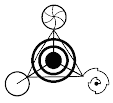Make no mistake, we all are products of this sexual energy and it is from supreme light from which we came and it will be supreme light to which we will return.
Tuesday, December 31, 2013
The Supreme Light and the creation of our universe.
Wednesday, December 11, 2013
The Palermo stone
1st Dynasty of ancient Tama-Re as written on the Palermo stone circa 2392-2283 BCE (but probably much older...)
Ptah, Ra, Shu, Geb, Osiris (Ausar), Set, Horus (Haru), Thoth (Djehuti - aka Yĕhuwdiy), Ma'at
Pray in earnest to your lineage....
Monday, September 23, 2013
Lasers and advanced tech in ancient Tama-Re
The Dendera lights are Plasmatic lasers. They are simply showing you how the stones were cut as well as the lights used to build this most sacred tomb of which is enclosed totally in darkness when shut. Early 19th century Egyptologists who wrote by candlelight had no idea what they were looking at. You can see clearly the magnetic coil, the laser filament, the bulb and the electric cord.
Bowl shaped object made from stone and cut with a laser. Literally impossible to recreate without advanced electronic plasma laser cutting tech.
Hydroplane type object made from stone and cut with a laser. Literally impossible to recreate without advanced electronic plasma laser cutting tech.
Hydroplane type object made from stone and cut with a laser.
Perfectly cut cylindrical holes. Sonic basins at Abu Rawash. A completed Mir who's top exploded.
Sonic basins at Abu Rawash cut from granite.
The following video exhibits the types of scientific levitating processes using sound that took place at the Giza Plateau and at Abu Rowash to build these great Mirs.
Thursday, September 5, 2013
Salaatu PTAH! (The Opener)
How to correctly honor and appease your great ancestors who live upon crest of eternity aka the Horizon! ([Haru-zone])
- Rise just before dawn.
- Facing East place hands at sides and bow two times.
- Look upward and raise opened hands to cup of both ears, then clasp them on your stomach.
- Sit on knees with open palms on thighs.
- Bow head to the ground while on knees.
- Sit up still on knees and slowly look over one shoulder and then the other while pointing one index finger outward with both hands resting on thighs.
- While still sitting on knees bow head again to the ground.
- Stand, place hands at sides and bow two more times.
At night just before bed repeat again only bow four times instead of two when you start. (Salaatu Ashtar)
The following examples of prayer are from the Abrahamic religions of which all were birthed by the sacred religious piety of the ancient Tamarean thousands of years prior.
 |
| Islamic |
 |
| Yemani Hebrew |
 |
| Ashkenazim Hebrew |
Prayer times.
 | |||||
I. Ptah [Dawn / Fatia] {bow 2x's}
II. Aten / Djehuti (Thoth) [Noon / Thuhr ] {bow 4x's}
III. Ausar (Osiris) [Afternoon / Asr] {bow 4'xs}
IV. Ma'at [Sunset / Maghrib] {bow 3x's}
V. Ashtar (Auset, Isis, Nut) [Night / Ishaa] {bow 4x's}
Saturday, April 20, 2013
Etymology of the word Moor.
Wednesday, February 20, 2013
Exercise your pineal gland.
Exercise your pineal gland. A LIGHT based organ that responds to frequencies of light.
Wednesday, January 16, 2013
The Etherians
Friday, January 11, 2013
A Roman is the King of the Hebrews?
Islam, Judaism and ancient Tama-Re
Subscribe to:
Comments (Atom)

































